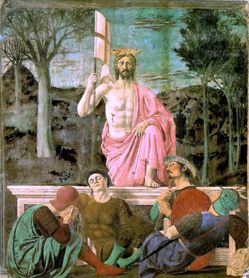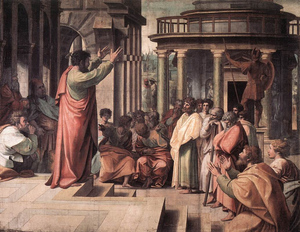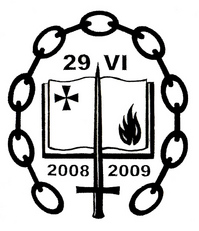 In last Wednesday's catechesis [11/19], I spoke of the question of how man is justified before God. Following St. Paul, we have seen that man is not capable of making himself "just" with his own actions, but rather that he can truly become "just" before God only because God confers on him his "justice," uniting him to Christ, his Son. And man obtains this union with Christ through faith.
In last Wednesday's catechesis [11/19], I spoke of the question of how man is justified before God. Following St. Paul, we have seen that man is not capable of making himself "just" with his own actions, but rather that he can truly become "just" before God only because God confers on him his "justice," uniting him to Christ, his Son. And man obtains this union with Christ through faith.
In this sense, St. Paul tells us: It is not our works, but our faith that makes us "just." This faith, nevertheless, is not a thought, opinion or idea. This faith is communion with Christ, which the Lord entrusts to us and that because of this, becomes life in conformity with him. Or in other words, faith, if it is true and real, becomes love, charity -- is expressed in charity. Faith without charity, without this fruit, would not be true faith. It would be a dead faith.
We have therefore discovered two levels in the last catechesis: that of the insufficiency of our works for achieving salvation, and that of "justification" through faith that produces the fruit of the Spirit. The confusion between these two levels down through the centuries has caused not a few misunderstandings in Christianity.
In this context it is important that St. Paul, in the Letter to the Galatians, puts emphasis on one hand, and in a radical way, on the gratuitousness of justification not by our efforts, and, at the same time, he emphasizes as well the relationship between faith and charity, between faith and works. "For in Christ Jesus, neither circumcision nor uncircumcision counts for anything, but only faith working through love" (Galatians 5:6). Consequently, there are on one hand the "works of the flesh," which are fornication, impurity, debauchery, idolatry, etc. (Galatians 5:19-21), all of which are contrary to the faith. On the other hand is the action of the Holy Spirit, which nourishes Christian life stirring up "love, joy, peace, patience, kindness, generosity, faithfulness, gentleness, self-control" (Galatians 5:22): These are the fruits of the Spirit that arise from faith.
 At the beginning of this list of virtues is cited ágape, love, and at the end, self-control. In reality, the Spirit, who is the Love of the Father and the Son, infuses his first gift, ágape, into our hearts (cf. Romans 5:5); and ágape, love, to be fully expressed, demands self-control. Regarding the love of the Father and the Son, which comes to us and profoundly transforms our existence, I dedicated my first encyclical, Deus Caritas Est. Believers know that in mutual love the love of God and of Christ is incarnated by means of the Spirit.
At the beginning of this list of virtues is cited ágape, love, and at the end, self-control. In reality, the Spirit, who is the Love of the Father and the Son, infuses his first gift, ágape, into our hearts (cf. Romans 5:5); and ágape, love, to be fully expressed, demands self-control. Regarding the love of the Father and the Son, which comes to us and profoundly transforms our existence, I dedicated my first encyclical, Deus Caritas Est. Believers know that in mutual love the love of God and of Christ is incarnated by means of the Spirit.
Let us return to the Letter of the Galatians. Here, St. Paul says that believers complete the command of love by bearing each other's burdens (cf. Galatians 6:2). Justified by the gift of faith in Christ, we are called to live in the love of Christ toward others, because it is by this criterion that we will be judged at the end of our existence. In reality, Paul does nothing more than repeat what Jesus himself had said, and which we recalled in the Gospel of last Sunday, in the parable of the Final Judgment.
In the First Letter to the Corinthians, St. Paul becomes expansive with his famous praise of love. It is the so-called hymn to charity: "If I speak in human and angelic tongues but do not have love, I am a resounding gong or a clashing cymbal. ... Love is patient, love is kind. It is not jealous, (love) is not pompous, it is not inflated, it is not rude, it does not seek its own interests ..." (1 Corinthians 13:1,4-5).
Christian love is so demanding because it springs from the total love of Christ for us: this love that demands from us, welcomes us, embraces us, sustains us, even torments us, because it obliges us to live no longer for ourselves, closed in on our egotism, but for "him who has died and risen for us" (cf. 2 Corinthians 5:15). The love of Christ makes us be in him this new creature (cf. 2 Corinthians 5:17), who enters to form part of his mystical body that is the Church.
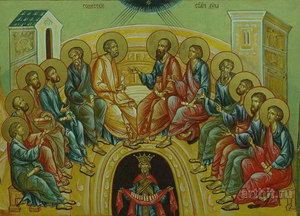 From this perspective, the centrality of justification without works, primary object of Paul's preaching, is not in contradiction with the faith that operates in love. On the contrary, it demands that our very faith is expressed in a life according to the Spirit. Often, an unfounded contraposition has been seen between the theology of Paul and James, who says in his letter: "For just as a body without a spirit is dead, so also faith without works is dead" (2:26).
From this perspective, the centrality of justification without works, primary object of Paul's preaching, is not in contradiction with the faith that operates in love. On the contrary, it demands that our very faith is expressed in a life according to the Spirit. Often, an unfounded contraposition has been seen between the theology of Paul and James, who says in his letter: "For just as a body without a spirit is dead, so also faith without works is dead" (2:26).
In reality, while Paul concerns himself above all with demonstrating that faith in Christ is necessary and sufficient, James highlights the consequent relationship between faith and works (cf. James 2:2-4). Therefore, for Paul and for James, faith operative in love witnesses to the gratuitous gift of justification in Christ. Salvation, received in Christ, needs to be protected and witnessed "with fear and trembling. For God is the one who, for his good purpose, works in you both to desire and to work. Do everything without grumbling or questioning ... as you hold on to the word of life," even St. Paul would say to the Christians of Philippi (cf. Philippians 2:12-14,16).
Often we tend to fall into the same misunderstandings that have characterized the community of Corinth: Those Christians thought that, having been gratuitously justified in Christ by faith, "everything was licit." And they thought, and often it seems that the Christians of today think, that it is licit to create divisions in the Church, the body of Christ, to celebrate the Eucharist without concerning oneself with the brothers who are most needy, to aspire to the best charisms without realizing that they are members of each other, etc.
The consequences of a faith that is not incarnated in love are disastrous, because it is reduced to a most dangerous abuse and subjectivism for us and for our brothers. On the contrary, following St. Paul, we should renew our awareness of the fact that, precisely because we have been justified in Christ, we don't belong to ourselves, but have been made into the temple of the Spirit and are called, therefore, to glorify God in our bodies and with the whole of our existence (cf. 1 Corinthians 6:19). It would be to scorn the inestimable value of justification if, having been bought at the high price of the blood of Christ, we didn't glorify him with our body. In reality, this is precisely our "reasonable" and at the same time "spiritual" worship, for which Paul exhorts us to "offer your bodies as a living sacrifice, holy and pleasing to God" (Romans 12:1).
To what would be reduced a liturgy directed only to the Lord but that doesn't become, at the same time, service of the brethren, a faith that is not expressed in charity? And the Apostle often puts his communities before the Final Judgment, on which occasion "we must all appear before the judgment seat of Christ, so that each one may receive recompense, according to what he did in the body, whether good or evil" (2 Corinthians 5:10; and cf. Romans 2:16).
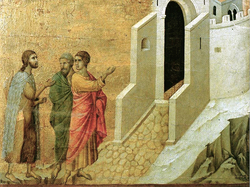 If the ethics that St. Paul proposes to believers does not lapse into forms of moralism, and if it shows itself to be current for us, it is because, each time, it always recommences from the personal and communitarian relationship with Christ, to verify itself in life according to the Spirit. This is essential: Christian ethics is not born from a system of commandments, but rather is the consequence of our friendship with Christ. This friendship influences life: If it is true, it incarnates and fulfills itself in love for neighbor. Hence, any ethical decline is not limited to the individual sphere, but at the same time, devalues personal and communitarian faith: From this it is derived and on this, it has a determinant effect.
If the ethics that St. Paul proposes to believers does not lapse into forms of moralism, and if it shows itself to be current for us, it is because, each time, it always recommences from the personal and communitarian relationship with Christ, to verify itself in life according to the Spirit. This is essential: Christian ethics is not born from a system of commandments, but rather is the consequence of our friendship with Christ. This friendship influences life: If it is true, it incarnates and fulfills itself in love for neighbor. Hence, any ethical decline is not limited to the individual sphere, but at the same time, devalues personal and communitarian faith: From this it is derived and on this, it has a determinant effect.
Let us, therefore, be overtaken by the reconciliation that God has given us in Christ, by God's "crazy" love for us: No one and nothing could ever separate us from his love (cf. Romans 8:39). With this certainty we live. And this certainty gives us the strength to live concretely the faith that works in love.
Benedictus XVI
Pontiff of the Roman Church
26 November 2008

